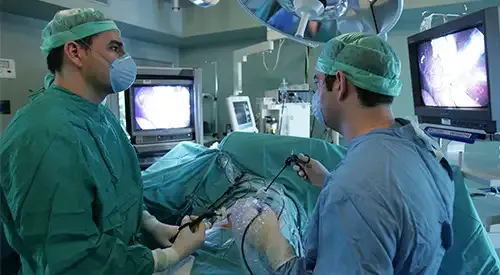Early Detection Program: Colorectal Cancer
Colon cancer is the third most common type of cancer. However, it is curable in 90% of cases if diagnosed early.
For this early diagnosis, there are different tests. The Clinic has the latest diagnostic technology to be able to detect it, even in a non-invasive way by means of an endoscopic capsule for more delicate patients.
To successfully treat colon cancer, not only is the speed of diagnosis important, but also the agility in establishing the correct treatment. For this reason, doctors work in multidisciplinary teams, seeking to offer a fast and effective solution for each case.
We have extensive experience and excellent results in the treatment of colorectal cancer. In the Clinic the disease is controlled in 98% of the patients, with an overall survival of 90%.
The Clinic has a Unit of Prevention and Consultation of High Risk of Digestive Tumors whose objective is to determine in patients' relatives the possibility of contracting the tumoral disease by means of a genetic test and, in such a case, to try to provide them with the appropriate follow-up to avoid suffering it.

Do you want to carry out this prevention program?
Request an appointment to be assessed by our specialists
Why at the Clínica Universidad de Navarra
Speed and accuracy
The diagnostic process integrates the molecular biology of the tumor to achieve the most complete diagnosis in the shortest time possible.
Specialized team
Professionals from different specialties work together and coordinated to offer patients the best solution in each case.
Cutting edge technology
All the diagnostic tests and state-of-the-art technology to achieve a fast and accurate diagnosis of the disease.
Experience
The Clinic is a pioneer in the Colorectal Cancer Early Detection Program.
Learn about the Colon Cancer Early Detection Program
What does it consist of?
- Medical consultation.
- Specific personal and family history questionnaire.
- Blood analysis.
- Endoscopic or virtual colonoscopy in patients over 50 years old or before if there is a family history.
Who is it aimed at?
The program is aimed at people over 50 years of age.
20% of patients affected by colon cancer have a close relative (parents, siblings or children), diagnosed with colon cancer.
For this reason, it is important to know the history in order to evaluate if a more exhaustive control is necessary.
Diagnosis and treatment of Colon Cancer at the Clínica Universidad de Navarra

To reach a diagnosis of colorectal cancer, it is necessary to directly visualize the colon to assess whether there are lesions and, if so, to take a sample for analysis:
- Conventional colonoscopy.
- Endoscopic capsule.
- Rectocolonic Echoendoscopy.
- Virtual Colonoscopy.
Other tests that can be performed to find out if the disease has spread can be:
- Chest X-ray.
- Scanner or TAC.
- Magnetic resonance.
- PET SCAN.

Surgical treatment: conventional or laparoscopic removal of the tumor
The objective is to remove the tumor, with sufficiently wide margins the main arterial and venous vessels that nourish the intestinal segment in which the tumor is located the regional lymph nodes.
The resection can be performed by conventional means or by laparoscopic surgery, with a smaller incision and a faster post-operative period.
Once the tumor is removed, it is analyzed in the Pathological Anatomy Department. Depending on the characteristics of the tumor it may be necessary to administer treatment with chemotherapy and/or radiotherapy as an adjunct to surgery.
Tumor with metastasis
When colon cancer has spread, one of the areas where it most often metastasizes is the liver. The goal of treatment is the surgical resection of the liver metastases and the primary tumor, since this increases the patient's survival.
If the metastases cannot be operated on, other types of treatment can be carried out to control the disease:
Chemotherapy combined with new biological therapies, according to the molecular expression of the tumor.
- Intra-arterial chemotherapy to reach more selectively the foci of metastatic disease. It achieves more concentration of the drug without increasing toxicity and favours a greater response.
- Radioembolization of liver metastases with Ytrium spheres. Allows the consolidation of liver lesions after chemotherapy that are not susceptible to surgical removal.
The best professionals at your disposal
Formed by specialists in Digestive, Medical Oncology, Radiation Oncology, General Surgery, Radiology, Nuclear Medicine, Pathological Anatomy and follow-up with specialized nurses.






































